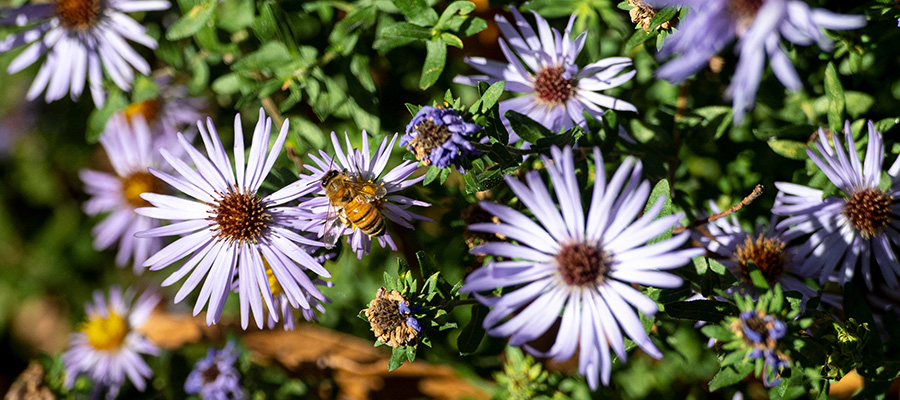Sustainability Practices

The Office of Sustainability was founded in 2006 to advance sustainability across the university in collaboration with students, faculty, staff, and additional campus partners.Throughout the 2021-2022 academic year, the Office of Sustainability received input from over 1,000 JHU students, faculty, staff, alumni, and community members through a variety of engagements. This resulted in a university-wide Sustainability Plan that is set to be released in spring 2023. The Sustainability Plan will outline interim goals and key objectives until 2030, while laying the groundwork for milestones that require longer planning and coordination. Ultimately, the Plan will provide the foundation for efforts that will reduce the institution’s greenhouse gas emissions, establish performance and healthy building and site guidelines, and asses climate-related risks and adaptation strategies.
Recycling
Housing buildings have single stream recycling which means all recycling can go in the same recycling bin.
The following items should be placed in the green recycle bin:
- Mixed office paper (including envelopes with clear windows, magazines, all
color copy paper, newspapers, etc.) - Cardboard (including cereal and packaged food boxes)
- Aluminum and steel cans, clean foil
- #1 and #2 plastic bottles and jugs only (including drink bottles, laundry detergent bottles, etc.) All other plastics should be placed in the incinerate bin
Food and beverage containers should be empty before recycling.
Electronics
Electronics can be recycled in the designated bins in the lobbies of each residence hall. Residents should erase any personal information from devices before recycling.
Basically anything with a battery or cord can be e-cycled, including:
- Computers
- Laptops
- Monitors
- Printers
- Cell phones
- Batteries
- Printer cartridges
- Computer accessories
Note: All batteries must be taped on both terminal ends and separated in zip top bags by type before recycling.
Academic Buildings
In the academic buildings on campus we do separate paper and cardboard from the container recycling (metal & plastic) because more paper is generated in academic spaces and keeping it separate creates a cleaner recycling stream.
Please separate your waste as follows:
- BLUE BINS: Paper and cardboard
- GREEN BINS: Metal, Plastic #1 & #2, and Glass (Glass is accepted in academic buildings because material is sent to a different recycling facility)
- YELLOW BINS: Compost
- GREY BINS: Trash
Terracycle
There are TerraCycle bins located in the lobbies of all buildings for hard to recycle items, including:
- Personal care products including cosmetic packaging like lipstick tubes, hair care packaging, and body lotion tubes
- Oral care products including toothbrushes, floss containers, and toothpaste tubes
- Energy bar wrappers, chip bags, and candy wrappers
- Writing utensils including pens, markers, mechanical pencils, and highlighters
Other Waste
All other waste should be placed in the gray trash (incinerate) bin.
Do your best to follow the guidelines and images on the waste bins signs but when in doubt, throw it out. Contamination in our recycling and compost bins can cause the loads to be rejected. Compost, trash, and recycling bins can also be found in lobbies, kitchens and common spaces throughout all of the residence halls and academic buildings.
Sustainable Living Tips
The Sustainable Living Guide is a collection of resources and recommendations intended to assist Johns Hopkins University community members achieve more environmentally conscious lifestyles.
Recommendations include:
- Turn off your laptop, monitor, printer, room lights, television, gaming system, etc. when not being used and when you leave your room.
- Turn off the faucet while you brush your teeth, wash your face and hands, shave, etc.
- Purchase and use reusable products including water bottles, to-go mugs, utensil set, stainless steel straws, lunch bag, snack bag, produce bag, food wrap, and more. Stock your room with reusable plates, bowls, and utensils to eliminate the need for single-use items.
To learn more, visit JHU Sustainability at sustainability.jhu.edu or follow us on Facebook and Instagram: @jhusustainability
Green Move-in & Move-Out
Green living starts with Move-In.
While many students refer to general university packing lists prior to move-in, these lists often include unnecessary items that are already made available to students by their institutions. With this in mind, we’ve created a Green Packing List for students to follow when buying supplies, decor, clothes, and personal items before arriving at Hopkins. Using this list, in addition, to buying items second-hand and coordinating with your roommate(s), are impactful and cost-effective strategies to reduce your resource consumption and environmental impact prior to and during move-in.
As part of Housing Operations’ commitment to sustainability and giving back to the community, a Green MoveOut program provides an opportunity for residents to donate all of their unwanted but usable clothing, shoes, housewares, books, toiletries and appliances as well as unopened, non-perishable food to the local non-profits. Due to COVID-19, plans for a Green Move-Out are on hold.
Please check the Office of Sustainability website for updates. To learn more, visit JHU Sustainability at: sustainability.jhu.edu/green-move-in-move-out.
Interactive Resources
The Office of Sustainability’s Homewood Sustainability GIS Map and StoryMap are interactive tools designed to teach viewers about sustainability efforts made on the Homewood Campus to improve the natural and built environment, decrease energy and resource use, and mitigate harmful environmental impacts. You can click and drag to explore the GIS map, and scroll through the more contextual StoryMap, while walking around campus to learn about the features around you.
Getting Involved
Students who are interested in getting more involved with sustainability initiatives across campus should visit the Office of Sustainability website or email [email protected] to learn more about student groups, the Office of Sustainability, and the Sustainability Leadership Council.
